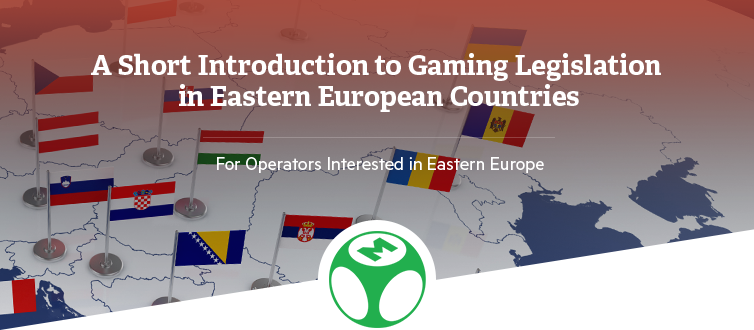A Short Introduction to Gaming Legislation in Eastern European Countries

Eastern European countries have discovered the high potential of online gambling and are now taking steps to become part of the global iGaming industry.
Though there are jurisdictions – like the Russian Federation – that oppose and block operators from offering gambling options on their internal markets, we have countries such as Belarus, Bulgaria and Romania who recently adopted gaming laws in order to allow international operators apply for licences.
At the same time, we find countries like the Czech Republic and Poland, where the regulatory framework is not yet created, even though unlicensed sites are offering gambling options to players in these states.
To stop this negative evolution of the market, gaming laws need to be implemented as soon as possible.
For established and start-up operators that are interested to launch online gambling businesses in the Eastern part of Europe, taking the legal path in order to obtain the necessary gaming licences in the national states’ territories is mandatory.
For this reason, every player in the industry should stay up-to-date with the latest legislative developments in the targeted countries and be aware that changes in this field occur all the time.
Gaming legislation in Eastern Europe
Recent developments have indicated that change is a permanent constant in the world of gambling. From technological advances to new legislative measures in the entire European space, the Eastern part of the continent is soon to follow in keeping up with the increasing pace of online gambling development.
The emerging online gambling industry in Eastern Europe attracts large interest and consistent financial investment from suppliers and operators throughout the industry and despite the fragmented nature of the national territories and the various local jurisdictions set in place, the high potential available in the region offers interesting opportunities.
To have a larger picture of the Eastern European space, let’s take a closer look at the countries in the region:
Albania
In Albania, gaming legislation allows casino gaming activities from the beginning of 2000. The current gaming laws regulating the market in Albania allow a limited form of gambling for sports betting, national lottery and certain types of casinos.
Though the state authorities allowed foreign based operators to run iGaming activities in the country without a licence for a number of years, at this moment there are plans to start issuing licences and block those operators that lack one.
Belarus
Online gambling activities are illegal in the country and starting January 2012, the authorities made it illegal for the citizens to access foreign gambling websites. In 2014, the government announced that it will launch a state-run gaming portal that it would start issuing licences for operators that are based in the country. Gaming legislation is necessary before any change takes place, though state authorities are optimistic about the future increases in budget revenues.
Bosnia and Herzegovina
Online gambling activities are regulated in Bosnia and Herzegovina, including casino games, sports betting and national lottery. Now, there are two casinos, two lottery operators and a high number of sports betting shops. At the beginning of 2013, there was an unsuccessful attempt to block foreign based online gambling websites.
Bulgaria
The Bulgarian authorities decided to introduce gambling legislation in 2008 to allow taxation of gaming sites. The laws were further reinforced with additional details in 2012. They were intended to provide operators with permission to obtain a gambling licence in Bulgaria and run their gambling activities legally.
Authorities took the step to impose heavy taxes in 2013 by granting gambling licences, only to meet strong opposition from business operators. The same year they introduced the Bulgarian Gambling Reform Bill, which lowered the financial demands in order to attract more online gaming operations.
Right now, any international operator in the European Union can apply for a licence to access the Bulgarian market. The following gaming activities are regulated: sports betting, horse race betting, poker, casino, bingo and lottery (state monopoly).
Croatia
After gaining access to the European market in 2013, the country took steps to adapt to the European gaming legislation. Nevertheless, in 2014 the Croatian authorities tried to push laws that increased the local operators’ monopoly, by allowing only land-based casinos and betting operators access a gambling licence.
Presently, the following gaming activities are regulated: sports betting, horse race betting, poker, casino, bingo and lottery (state monopoly).
Czech Republic
Online gambling is legal in the Czech Republic and operators that target the country’s citizens are required to pay a tax for their activities. At this moment, foreign online gambling operators are not allowed to offer gaming services to the Czech citizens. Nevertheless, the law is not enforced and the foreign gambling sites can be accessed by anyone in the Czech Republic.
For the following years, there are plans to introduce a new Czech lottery law that will protect players from gambling addiction and finally open the internal market to international gambling operators, though high taxes for the offered licences should be expected. At present, the following gaming activities are regulated: sports betting, lottery (state monopoly) and horse racing betting.
Estonia
Estonia started imposing online gaming regulations in 2010. The two main laws that control online gaming in the country are the Gambling Act and the Gambling Tax Act.
Though initially only Estonian operators were allowed on the market, starting with 2011 authorities opened the market to international gaming businesses. To make life easier for international operators, from 2012 they were no longer required to keep the servers in the country. As soon as the market was regulated, the authorities started blocking gambling sites without licence by various means.
At this moment, to run an online gaming business in Estonia, an operator needs two licences. An activity licence which checks the company will respect the Gambling Act’s requirements and an online gaming licence that can be obtained through the Estonian Tax and Customs Board. As of today, the following gaming activities are regulated: sports betting, horse race betting, poker, casino, bingo and lottery (state monopoly).
Hungary
Hungary’s online gambling market is under state monopoly according to the present gaming legislation. The Hungarian authorities consider according two gambling licences to existing land-based casinos, which is not enough considering the larger number of foreign iGaming operators that want to enter the Hungarian market.
Since there is an increasing opposition from the European Union’s legislative bodies, which underline the lack of transparency and open access to the common European market for all gaming operators, the future is difficult to predict.
Though foreign gaming operators are banned from entering Hungary, the ban is ignored by many gaming sites that continue to offer gambling services to Hungarians. The following gaming activities are regulated: sports betting, horse race betting, poker, casino, bingo and lottery.
Latvia
Internet gambling operations in Latvia were unregulated until 1998. In 2003, the iGaming market has been regulated and laws were passed in order to allow this activity. From that moment, all gambling websites that offer services to Latvian players have to be licensed and pay tax on revenues.
The main regulatory body in the country that issues licences is the Lotteries and Gambling Supervisory Inspection. Additional laws that were passed in 2006 and 2011 threaten to deny international operators’ access to the Latvian market.
The laws were enforced at the beginning of 2014 by the Latvia Lotteries and Gambling Supervision Inspection authority and a number of actions to block blacklisted gambling websites took place.
Lithuania
Since 2011 over 17 companies have been licensed to offer gambling services in the country. Nevertheless, the gaming legislation does not mention Internet gambling and prohibits these activities without taking any real steps to enforce them.
For this reason, foreign companies are able to access the market and offer their services to the country’s citizens. Gambling Supervisory Authority in Lithuania has launched a series of talks in the country to legalize and regulate Internet gambling activities.
The latest changes that occurred in the legislation require online operators to establish a physical office in Lithuania and to have as partner a local land-based gambling operator.
Macedonia
Online gambling is very popular in Macedonia and the state authorities revealed a number of measures and plans to create a monopoly over online gambling services.
In 2014, the government started to create a regulated iGaming market in a partnership with Casinos Austria to launch the state-controlled company that offers sports betting, poker and lottery. The Macedonian iGaming market monopoly has drawn attention from the European Commission and its gaming legislation is yet to be analyzed.
Moldova
In Moldova, online gambling is legal and the citizens can access local and foreign gambling websites.
Montenegro
Montenegro became an independent state in 2006 and from the start, the authorities have decided to make gambling legal. The main body that regulates the industry is the Games of Chance Administration.
Online betting services were legalized in 2011 and the same Games of Chance Administration institution imposes laws that were meant to attract and help investors in the industry.
At this moment, main players in the iGaming market from Montenegro can access licensing, financial and hosting services. International operators can apply for licences that are necessary for sportsbooks, live casinos, poker and card games.
Poland
The online gambling market in Poland was unregulated up to 2009, when a series of corruption scandals affected the political sphere and legal demands were forced into action. Two laws related to online gaming were passed in 2009 and 2011, which practically set a ban on all gambling activities, except for sports betting businesses.
According to the present law, gambling licences for online sportsbooks are granted for a period of 6 years and only to the businesses that are based in the country. Nevertheless, in spite of hefty penalties against operators that offer illegal gaming options to the Polish citizens, there are few real actions against them.
Under increasing pressure from the European Commission that usually focuses on protecting the interests of the European Union as a whole, there are open talks to open the Polish gaming market in the future.
Romania
Online gaming activities have been regulated in 2013, by creating a National Gaming Office. Though it was legal before 2013, there was no institution that could grant gaming licences to operators.
Romanian authorities tried to impose online gambling sites share some investment in land-based casinos, but the European Commission intervened and gamblers in Romania were able to access foreign online gambling sites. To access the Romanian market and offer betting services, all online gaming operators need to secure a gambling licence from the National Gaming Office.
Russia
In Russia, the iGaming business operations are banned. Russian citizens used to place bets on foreign gaming websites, but now there are increasing demands from authorities to block the websites.
There is a state-controlled lottery which allows gamblers to place bets. Though the laws against online gaming are more than clear, it is unlikely Russian citizens will be brought into justice.
Serbia
Up to 2011, online gambling was not regulated in Serbia and black market activities were on the rise. That year, the government passed gaming legislation that allowed the country’s citizens access online gaming websites.
Since the law requires gambling sites to have an actual presence in the country, a high number of websites have been closed down.
Slovakia
From a legal point of view, online gambling activities are allowed in Slovakia. Still, there should be noticed the government did not grant any licences to operators in the country. The country’s citizens place bets and play casino games on foreign online gambling sites, activities which the government did not manage to stop.
Slovenia
Slovenia has become an independent country after 1991 and in the 1995, the Slovenian Gaming Act appeared in order to control the land based gambling activities. Casinos, for example, bring an important contribution to Slovenia’s budget revenues. Unfortunately, online gambling is not at this moment regulated and operators are not able to obtain a gaming licence.
From an official point of view, the National Lottery in Slovenia is the single authority that can provide online gambling services and impose gaming legislations to prohibit international companies from accessing the Slovenian market. In reality, foreign operators are already delivering online gambling services in Slovenia and there are no real measures imposed to stop this activity right now.
Ukraine
Online gambling activities are banned in the country and authorities take steps to block and punish those citizens that access those websites. Still, there is a national state-controlled lottery available online that offers gambling services. Interested gambling operators that want to enter Ukraine to open online business are still far from being protected by a clear gaming legislation in this area.
Conclusion
The European gambling industry is going through a period of change and an increasing number of countries throughout the Old Continent are adopting and enforcing gambling legislations. This change affects the European industry and forces a major shift in mentality, where operators, suppliers and regulators need to cooperate in order to develop their businesses.
Every operator acknowledges that obtaining a gambling licence is an important element to secure in order to access a particular jurisdiction, but for major suppliers it is also an important aspect of their activities, since gaming software needs to respect local demands.
As new countries regulate and approve online gambling activities in Europe, all major software suppliers need to adapt and conform to the local regulatory frameworks from the targeted countries.
EveryMatrix is proactively assessing acquiring additional licences to access regulated markets. Our main drive is to facilitate our clients’ access to new territories and jurisdictions, that’s why we have been awarded licences in a number of reputable jurisdictions including Denmark, Malta, Ireland and the United Kingdom.
We have to indicate that changes in the above mentioned countries continue to take place on a constant basis and interested parties should always check for the latest developments in the targeted jurisdictions.
Ready to start a conversation?
The key for us as a true B2B iGaming software provider is to help gaming operators implement bold ideas and unleash their creativity. Everything is possible.
Talk to an expert






